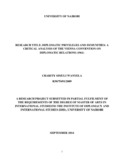Diplomatic privileges and immunities: a critical analysis of the Vienna convention on diplomatic relations (1961)
Abstract
The study examines the topic of diplomatic immunity and privileges. It attempts a critical
analysis of the Vienna Convention on Diplomatic Relations (VCDR) of 1961. The study
proceeds from the fact that the VCDR is the most global and universally accepted instrument
ever instituted to regulate diplomatic conduct. This diplomatic law has facilitates bilateral
diplomatic interaction for over fifty years but as this study points out in its research problem,
there has been a discrepancy between the stipulations of the Convention and general practice in
the field. This discrepancy, this study notes could be attributed to the weak provisions of the
Convention which provides room for rogue diplomats to either engage in criminal activities or
even personal aggrandizement ventures. The study further notes that in the face of the growing
attention given to universal human rights, how tenable is the near-blanket immunity accorded to
the diplomat? The study thus proceeds with the objective of examining the extent to which the
VCDR facilitates diplomacy and the extent to which diplomats have violated provisions of this
Convention and whether there have been challenges in the implementation of the VCDR. After
an extensive examination of existing literature on the subject the study concludes that there is
need for this study to fill the gap in literature as there is an inadequate pool of knowledge on the
area under study. Aware of this fact, the study hypothesizes that the established regime of
diplomatic immunities and privileges is effective in preventing diplomatic crime but the abuse of
diplomatic immunity is as a result of weak legislation and that the lack of an enforcement
mechanism in the VCDR has curtailed its implementation. The study therefore adopts the theory
of functional necessity as its guide in studying and analyzing this treaty. The study relies to a
large extent on secondary data and its analysis is therefore qualitatively done. After examining
the purview of diplomatic immunities and privileges, the study zeroes in on the Vienna
Convention on Diplomatic Relations upon which the study then makes an analysis. The study, in
its conclusion, notes that the Convention has been a key document in the conduct of diplomacy
and its value is attested to its universal acceptance and subsequent domestication in most
countries. The value of the functional necessity theory is also underscored in the conclusion but
the concept of personal inviolability, though useful for diplomacy to continue, is noted to be
under scrutiny due to human rights concerns. The study also identifies certain provisions in the
Convention which it notes as being vague thus subject to various interpretations or violations.
The study singles out provisions on the diplomatic bag, the family and the various provisions on
tax exemptions.The objectives of the study are therefore achieved whereby it documents
numerous cases of diplomatic abuses but notes that the VCDR has to a large extent facilitated
diplomatic relations between states. While noting the flaws in the current regime of diplomatic
laws, the study recommends a re-evaluation of this regime to be in line with current international
concerns on human rights but not to necessarily do away with immunities which have been key
to diplomacy. The study also recommends a regular appraisal of the Convention to make it be
responsive of any emerging issues in diplomacy while at the same time ensuring that diplomats
are fully responsible for their actions when carried out in their private capacity.
Publisher
University of Nairobi

